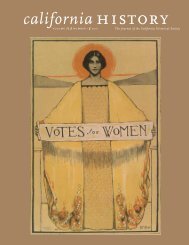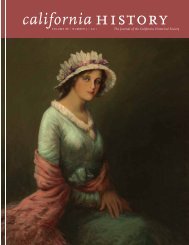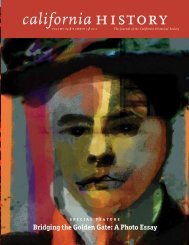Volume 90, Number 1 - California Historical Society
Volume 90, Number 1 - California Historical Society
Volume 90, Number 1 - California Historical Society
Create successful ePaper yourself
Turn your PDF publications into a flip-book with our unique Google optimized e-Paper software.
workings. Nonetheless, when battling enemies,<br />
the priests and settlers followed patterns first<br />
conceived by Muslims. They performed acts<br />
of sacrifice, spoke of their obligation to smite<br />
foes for God, and sometimes considered war a<br />
sacred enterprise. During the campaign to fight<br />
the pirate Hippolyte Bouchard in 1818, a settler<br />
asked heaven to bless his efforts: “Under the<br />
protection of the God of battles I believe I can<br />
destroy all such villains as may have the rashness<br />
to set foot upon this soil.” 5 A priest, meanwhile,<br />
mortified the flesh to seek divine support against<br />
Bouchard. According to a witness, the cleric<br />
prayed, abstained from food, and whipped himself<br />
so God would grant his compatriots victory. 6<br />
At the same time, and up through the 1830s,<br />
some priests accompanied military expeditions<br />
into <strong>California</strong>’s interior to capture or punish<br />
defiant Indians. If hostilities seemed certain, they<br />
said Mass for the soldiers and militia and then<br />
marched into battle beside the troops.<br />
Any claim about jihad’s influence in <strong>California</strong><br />
may sound far-fetched or confused. To some,<br />
jihad urges the believer to improve his character<br />
and nothing more. Others admit that Muslims<br />
did invoke jihad to make war, but some historical<br />
context is needed. In the first years of Islam,<br />
when Muhammad and his companions battled<br />
for their survival, they proclaimed jihad to convince<br />
believers that God was on their side. 7 It is<br />
also worth wondering if war in Muslim Spain was<br />
as prevalent as we suppose. There is no argument<br />
that Christians and Muslims fought one another,<br />
but just as notable, and perhaps for longer periods<br />
of time, the two sides, along with a sizable<br />
Jewish population, lived together in peace. 8<br />
There is also some question about the nature<br />
of war and its practitioners. Even if Muslims in<br />
Spain saw war as a religious obligation, it seems<br />
unlikely that such a practice would surface centuries<br />
later in <strong>California</strong>, a place thousands of miles<br />
20 <strong>California</strong> History • volume <strong>90</strong> number 1 2012<br />
away. Moreover, Franciscan priests had little in<br />
common with Muslims who saw war as an act<br />
of devotion. The Muslim mystics and pilgrims<br />
who supposedly went to battle abounded in<br />
great number, whereas the Franciscans, at least<br />
in <strong>California</strong>, were few, and those who joined<br />
campaigns fewer still. 9 The intrepid priests who<br />
accompanied troops into the field do not prove<br />
that all Franciscans saw war as a holy endeavor.<br />
(The sharp-eyed reader could add that Islam has<br />
no ordained clergy or sacraments, at least in<br />
the Christian, especially Catholic, sense.) As for<br />
the settlers in <strong>California</strong>, the most fundamental<br />
understanding of human nature shows that<br />
individuals do not need divine approval to fight.<br />
If religion did impel believers to take up arms,<br />
Christianity, not Islam, provided enough cause.<br />
The Book of Revelation, by itself, with its descriptions<br />
of bloodshed and beasts on the loose, could<br />
fire the imagination of any Christian warrior.<br />
Nonetheless, these doubts, while valid, and which<br />
will be addressed in due time, reflect a misunderstanding.<br />
The point is not that Muslims or Christians<br />
relished bloodshed. What matters more is<br />
how and under what circumstances Muslims and<br />
their Spanish-speaking counterparts considered<br />
war a sacred effort. But caution is in order. Professing<br />
similar attitudes, whether about war or<br />
anything else, does not mean one side mirrored<br />
the other. Although Muslims were the first to<br />
consecrate violence, Christians in Spain, when<br />
following suit, did not blindly imitate Islamic<br />
habits. Instead, they ensured that the prosecution<br />
of war conformed to their beliefs. Over time,<br />
as the Spanish-speaking inhabitants of <strong>California</strong><br />
would confirm, Christians had introduced<br />
so many changes that the Muslim imprint had<br />
largely disappeared. What remained, though,<br />
despite the overlay of Christian ritual and practice,<br />
was the Muslim conviction that war was a<br />
sacred calling. Thus, regardless of their faith,<br />
the men-at-arms knew when, and against whom,<br />
they could make piety assume lethal proportions.









